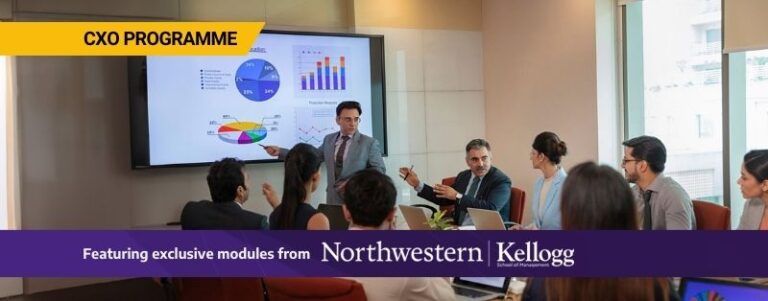How to Upskill and Reskill: A Guide to the Top 5 Strategies

A 2021 McKinsey report indicates that 87% of companies worldwide face an unforeseen skills gap. It further mentions that the lack of appropriate strategies to upskill and reskill lies at the heart of this problem. This shows that to future-proof your professional journey; you need to reframe the very idea of learning. That’s why today’s corporate culture has given a lot of traction to lifelong learning and adaptability. This blog focuses on how one can utilize individual growth goals as a means of skill development and face the climate of change with an evolving growth mindset.
The Need to Upskill and Reskill
Professionals look at learning and development as opportunities for career growth. A 2022 Training Magazine report claims up to 57% of US professionals planned to upskill. That being said, here’s how individual upskilling could be beneficial to you:
- Allows you to develop your niche of interest
- Helps you stay relevant in the job market
- Promotes self-discipline and self-initiative
- Prepares you for the workforce of the future
Here is the need for organizational upskilling:
- Boosts employee retention
- Continuous learning breeds a culture of empathetic change management
- Future-proof businesses by closing the skills divide
- Optimizes company efficiency and productivity by harnessing the most of modern technology
ALSO READ: What Are Self-Management Skills? How To Be the CEO of Your Career?
Strategies for Effective Upskilling and Reskilling
The following strategies to upskill and reskill could push you up the corporate ladder—as well as enable you to engage with the long-term organizational goals of the company:
 1. Pinpoint Your Goals
1. Pinpoint Your Goals
As you know, the hierarchies of the corporate ladder are diverse, and people upskill for a variety of reasons, depending on their goals. Each path has its requirements, and goal identification is of utmost importance to ascertain one’s developmental roadmap. Here are some questions you can ask yourself to get started:
- Why is this goal important to me? What meaning does it hold for me?
- How would I describe my success with this current goal?
- What will be my first step?
- Whose help do I need to reach this goal?
- What will accelerate my way to reach this goal?
- How long do I think it will take?
2. Check Your Knowledge Gaps
Knowledge gaps are the biggest hurdle to reaching your goals. Carefully check the job descriptions to thoroughly understand what is needed; this helps you address the gap between the demand for talent and its supply. Here are three important questions to ask:
- What competencies of mine already align with the necessary skills for the future?
- What business functions would be served by these newly learned skills?
- Should I upskill on my own or try to find a company-driven way to boost my knowledge?
3. Chalk Out a Plan
Here are some crucial elements to keep in mind while ticking the boxes of knowledge gaps:
- Find the cost of upskilling and how much of it you can afford
- Set SMART (Specific, Measurable, Attainable, Relevant, and Time-bound) goals to map
- Build a support system or network of equally interested individuals and mentors
Here are a couple of examples to upskill and reskill with the help of SMART objectives:
- I will study Python programming for two hours every day; this will enable me to finish learning about data structures and algorithms within three weeks
- I will research matte painting for two hours daily over the next four weeks. By doing this consistently, I will be able to complete a digital painting in Adobe Photoshop
ALSO READ: Concentrate on the Tasks That Matter Most With These Key Productivity Tips
4. Learn the Chosen Skills
This is the step where you start working on your missing skills. While consistency is key here, a result-based progress map yields quicker results. Planning, dedication, and patience help you apply your skills effectively. Here are some ways to stay motivated while learning:
- Keep reminding yourself of the end goals
- Never be afraid to seek help
- Visualize yourself in the phase of success after you achieve your goals
- Give a larger purpose to your goals
5. Skill Application
Starting small is the cornerstone of cumulative success. Consistent, practical application contributes to your new-found knowledge at your workspace or self-owned business. Here are some best practices for skill application:
- Select a colleague to check your new skill performance
- Create appropriate metrics for each step of your performance improvement
- Get into honest self-introspection and reflection
- Journal your progress and plans for the future
When you upskill and reskill with appropriate measures, it boosts your confidence, makes you noticeable in front of your seniors, and propels you toward bigger opportunities.
6. Keep Adapting
Upskilling is also another term for dedicated change management. A World Economic Forum report talks about embracing continuous change as the best means to future-proof businesses. New knowledge gaps will continue to pop up, making old jobs obsolete and pushing new opportunities with the prevalence of modern technologies.
The Benefits of Upskilling and Reskilling
All of us have heard about the trends of upskilling and reskilling. But how exactly do these help you? Let’s find out:
- Getting a raise: You will shoulder additional responsibilities, and you can use it as leverage for increasing your current salary.
- Career pivot: To upskill and reskill also means rediscovering your passions, enabling you to build on skills that make more financial sense to you. It also helps shift your career while understanding future market demands.
- Work-life enhancement: Getting to use new skills in older work processes bolsters your work motivation. Satisfaction also doubles up when your role expands due to your efforts to do things differently.
The Role of Employers in Upskilling and Reskilling
Here are some tips for employers to maximize employee value:
- Understand the skills gap to single out specific upskilling requirements of the company
- Empower employees by understanding the primary learning styles of the workforce, and tailor programs for each of them
- Allow employees to choose their programs to upskill and reskill
- Incentivize learning to keep motivating employees and boost Learning & Development (L&D) as an important part of the work culture
- Promote job shadowing so that employees can directly learn from experienced colleagues
- Enable mobile-first learning so that learning opportunities can be seamlessly accessible
- Measure learning outcomes by evaluating specific milestones and flexibly track learning modules
- Drive a positive environment around the entire process of learning; this includes making errors and extracting knowledge from the same
The Future of Work and Upskilling
A Lorman report mentions that 87% of millennials believe learning and development in the workplace is important. Additionally, at least 58% of the workforce requires new skills to perform well at their jobs. A combination of all these factors enabled the corporate learning industry to have a mammoth market size of $345.56 billion in 2021. It is projected to reach a value of $493.32 billion by 2028.
Upskilling and reskilling are the only tools that can weather the disruptive effects of automationTo conclude, upskilling is the future of work. To bring about a culture of innovation, everyone from employees to recruiters must participate in delivering effective learning solutions. Find the best insights to upskill and reskill with these online courses from Emeritus.
By Bishwadeep Mitra
Write to us at content@emeritus.org














